On Sadness, Joy, Writing, Hélène Cixous, Montaigne, Mothers and Myth
 12.11.2013
12.11.2013 

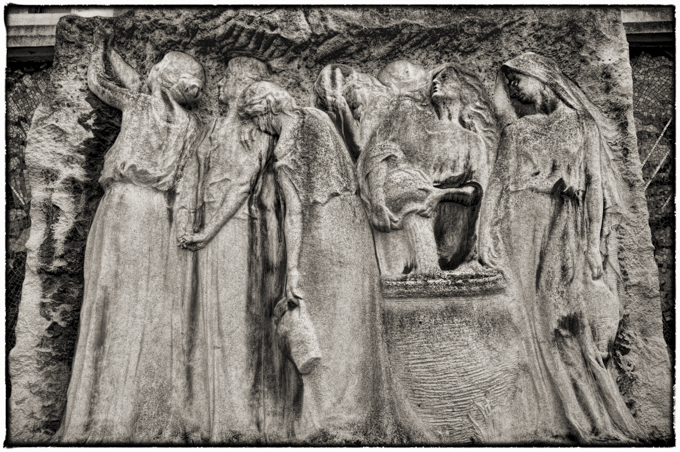
After the saddest year of my life (but was it, really? I ask myself, and answer, Yes, it was), I was surprised tonight to feel the joy returning. That old version of joy, of life as overflowing abundance. First, Richard and I went away for four days to Amsterdam. More on that in a later post.
A leisurely break, a honeymoon of sorts, followed by fresh energy for each of us in our work. The day after we returned to Paris, I sent off a chapter of my novel to a literary magazine. It’s strange, the shift, a new kind of detachment from the results of submitting work, a new kind of unwavering resolve.
I’ve had many professions, U.C. Berkeley language lab, tutor for the blind, model, cook on a schooner, waitress, bookseller in Sausalito, Cambridge and NYC, real estate agent, on-the-road art dealer, teacher of Greek myth.
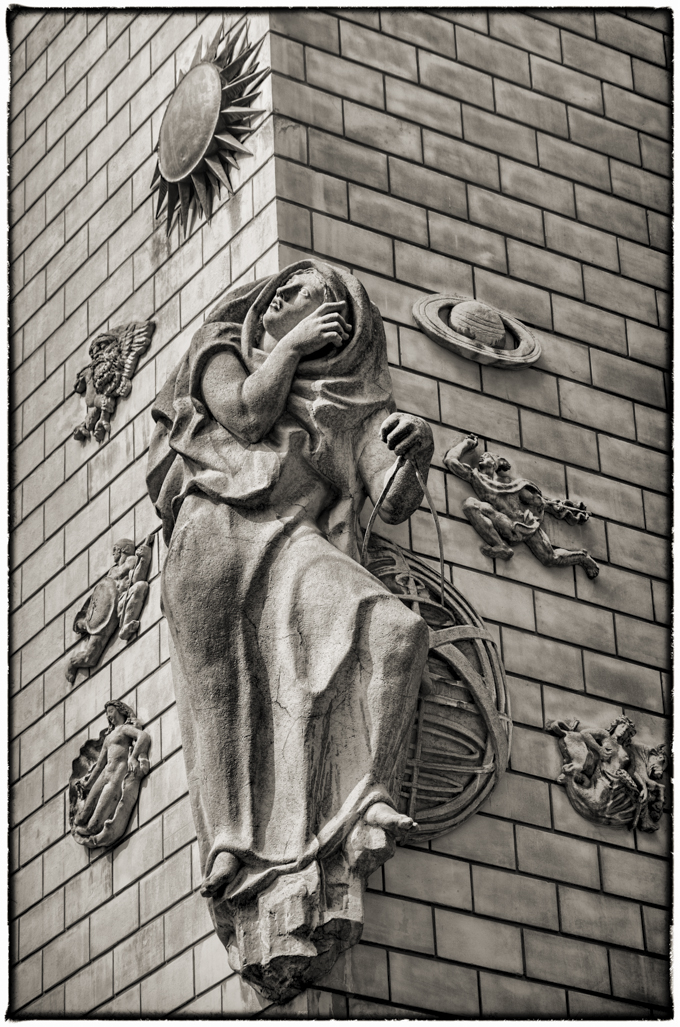
As an art dealer, I learned two things: finding the right gatekeeper is a simple matter of love—the artist’s sensibility resonating with that of the dealer/agent/buyer. And the value of the best art often takes people the longest to see.
My favorite of the artists I carried was invisible for a full year to everyone to whom I showed paintings, until, one day in my suite at Los Angeles' Chateau Marmont Hotel, a couple of top collectors walked in and flipped over this artist’s work. A few minutes later, they were in the hallway conferring, and minutes later, writing a big fat check. No accident that they did not need my vote of confidence in their taste (as many collectors did).
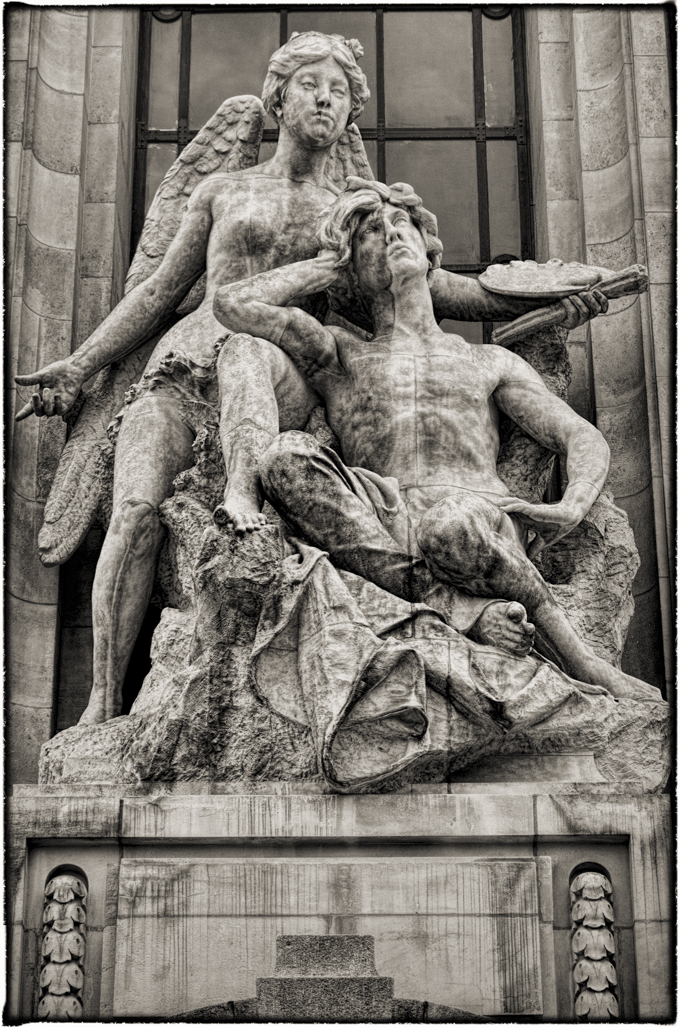
The structure of my novel is unorthodox, but the characters will not allow me to change it. Last night, after two-and-a-half hours in my favorite café, doing final editing and finishing chapter nine, the young couple next to me and I struck up a conversation. They asked me what I was writing. I told them (very briefly), and added (since they were Greek) that its structure was based on Greek myth. And then the woman and I began to talk about what is so wonderful about Greek mythology. (After a couple of millennia of strict monotheism in Greece, I am always surprised—delighted!—to encounter a Greek person, an engineer, no less, who loves Greek myth.) We agreed on three things: it represents divinity that is both male and female; these gods and goddesses are like human characters, with all their strengths and flaws; and it is essentially stories. I left the café feeling I'd been given a message, a gift.
And then tonight! Yow. Hélène Cixous read from her latest book, Twists and Turns in the Heart’s Antarctic, at Shakespeare and Company bookstore. First, her translator, Beverley Bie Brahic, read an English translation; then Cixous followed with the original in French. The text was poetic fiction, an essay, an epic, a Greek myth, about a daughter named Hélène, a brother, O., with whom she has a murderous relationship, and their 100-year-old mother, Eve. The images were closely observed, intimate; the metaphor, of Euridice (the mother) following Orpheus (the daughter/writer) shakily down some stairs. Stunning writing.
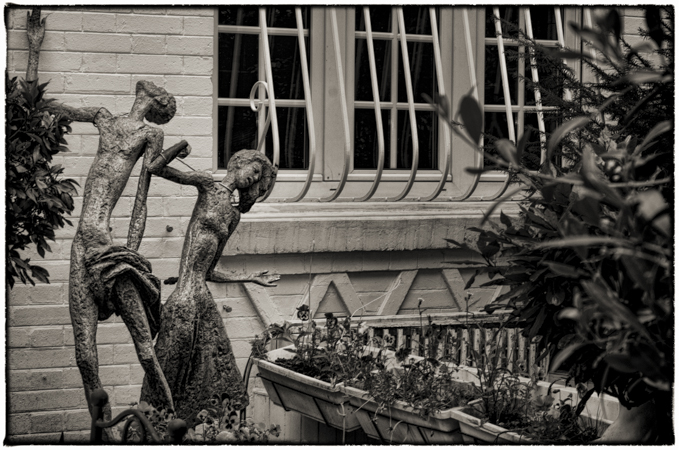
And this was peculiar, an image that sounded wonderful in English, the mother’s recent bond with a teddy bear, sounded slightly sentimental in French. In addition to the gorgeous writing, I felt a longing to live closer to my mother, the pain of being far from home soil, a pang of admiration-envy of my two sisters and brother who live so close to her. (For everything, there is a price, and this is the price for me of living in Paris.)
I have loved Hélène Cixous’s work for years. I drew closer, standing in the doorway, as H. C. answered questions after the reading. A beautiful face, big ears, long nose, Algerian-French, German Ashkenazi Jewish on her mother’s side, Pied-Noir Sephardic Jewish on her father’s. A fez cap, gray-green cardigan and scarf over a black sweater. A relaxed and delicate face. Nefertiti eyeliner. She looked a bit like Nefertiti.
She could not “enter” France for years, found the French too bourgeois, “carpeted,” until she found the door. That door was the tower of the small castle that had once belonged to the great essayist, Montaigne, in the town of the same name. His writing room was about the size of the room in which we were gathered. A view from the small windows of vastness, reminding her of Goethe’s view in Strasbourg. She felt the imprint of the books that had once surrounded him, though they are long gone.
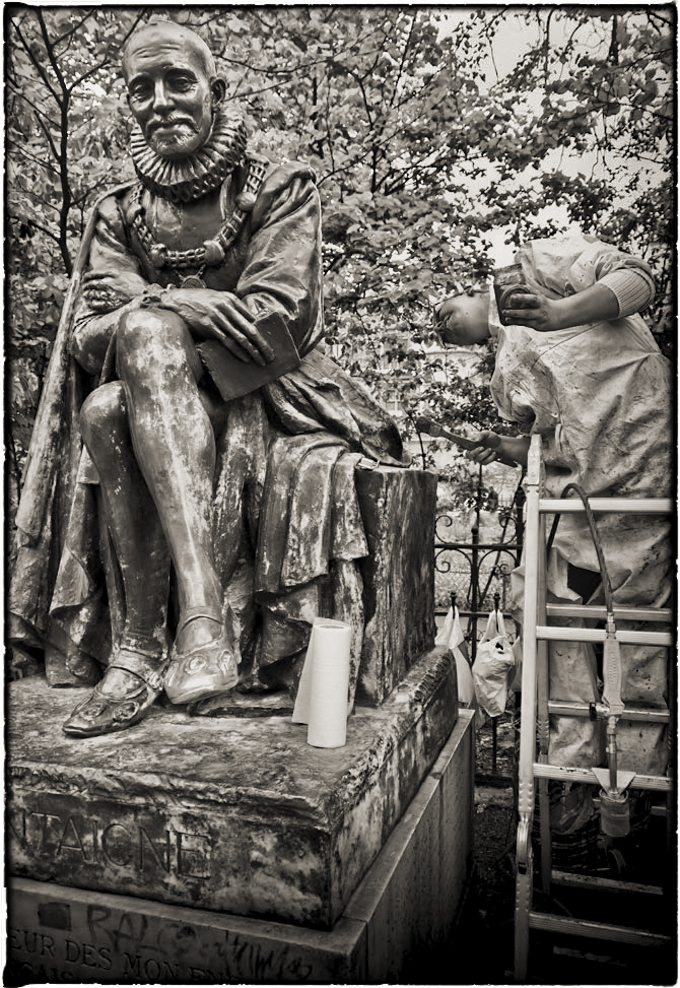
She now goes back to visit Montaigne’s tower once a year for inspiration. Of course, she says, you have to have read all of Montaigne’s essays for it to mean anything. Important things happened in this tower where he wrote. Kings visited the writer there, among them, King Henri IV, the first Protestant king of France. Henri IV, like Nelson Mandela, was a mediator, mediating between the Protestants and Catholics.
In response to a question about why she so often used the first person in her writing, Cixous said, the self is multiple, legion. (Yes! as are the forms of the divine, which is no longer entirely “out there,” or “up there,” but envisioned now as inside us, aspects of the collective unconscious.)
The translator discussed a French word haimé, a word Cixous invented by joining haïr, "to hate," to aimer, "to love." She struggled to find a graceful equivalent in English, and settled for "hateloved."
I asked Alex to save me a copy of Twists and Turns, and bolted out of Shakespeare and into the street, too happy to wait in line. I called our favorite restaurant to see if they had a table for one. “Oui, Karine!” said David. Had hareng with potatoes and carrots, and warm goat’s cheese on tiny pieces of toast. Then as the restaurant filled with no one but French-speaking diners who were spilling over with exuberance tonight, I left to walk to my (second-)fave café to write this letter to you.
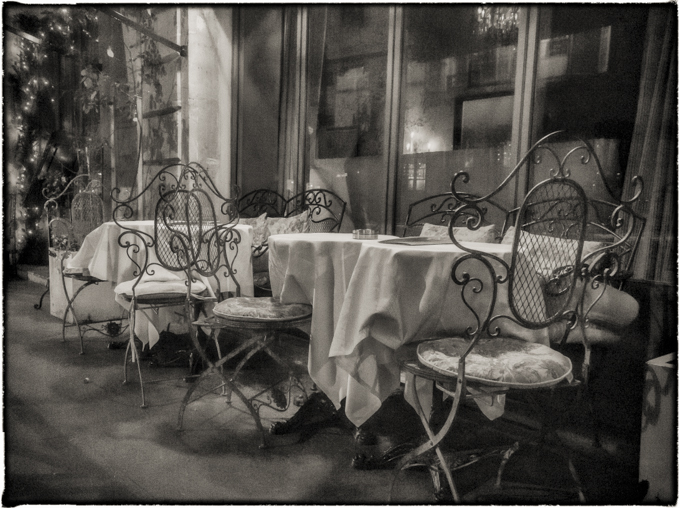


Reader Comments (15)
Dear Kaaren and Richard
(Letting the winds of uplift carry you... here's a little poem to hurrah you on your way...)
THE PRACTICE OF ECSTASY
The tea refused to stay in its cup
floating in the air like a dark sunrise
The space in the door refused to stay in its frame
and walked out around various people and things
providing a clear way through
Little buttons refused to stay up and down a lapel
and formed curlicue designs on the side plackets instead
A general ecstasy took over
no one refused its invitation to drop their usual
concerns they unstrapped them unhooked them unleashed their
terrible tigers let their harnesses go so the fiery
stallions of their usual concerns could run free
The light refused to stay put in its place and visited
everyone’s eyes one by one and collectively
The wind refused to go in just one direction and so it
blew up from beneath and out from inside and
from the top down enough to loosen the hinges of
everyone’s preconceptions
We strode out for the first time unencumbered with fixed
prejudices
A sound was purely itself in the great orchestral
swell of things
voices part of the ongoing saga from the
beginning of time to the present and
tunneling forward
Little tiny things refused to be overlooked and joined in the
general celebration
A shout went up in the air and continued
ascending
A blue ray fell through its center and turned it
to song
______________________________________________
1/5/01 (from Blood Songs, The Ecstatic Exchange, 2012)
Wonderful column. My favorite so far! Nuanced, incisive, wise. I love the photos too.
Beautiful writing. Thank-you.
Lovely post, both the visuals and contemplations.
And also love poem above : The Ecstatic Exchange.
xx,
Amy your fellow Parisienthusiast
Love this Paris Play, Kaaren & Richard! I will print it out and share it with mom.
Here is a wonderful quote from a friend's FB post that seems to speak to our
need to be human: to laugh and play and remember the joy that life can bring
and we can help create! Kudos to you for writing so diligently, for sending off
a chapter and for your descriptions of your environs and the people who inhabit
it! Hugs galore! Suki
"An age is coming when machines will be able to do everything. But how will we know a machine is not conscious—how do we know another human being is conscious? There is only one way. When it starts to play. In playfulness lies the highest expression of the human spirit. Doing pointless, purposeless things, just for fun. Being silly for the sake of being silly. Taking pleasure in activities that have nothing to do with our survival. Caprice. Frolic. Joke. Jest. Dance. These are the highest signs of intelligence. It is when a creature, having met and surmounted all the practical needs that face him, decides to dance that we know we are in the presence of a human.”
Matthew Parris in NewRepublic.com
Daniel,
You who are the master of ecstasy know how to sing its song!
Thank you for this poem and your blessings.
Much love to you and Malika,
Kaaren & Richard
Dear Susan,
Do you know how much that means coming from you, exquisite essayist?
I somehow had not registered that Montaigne's castle is in the Dordogne. A pang...
Much love,
Kaaren & Richard
Chere Tristine,
I'm so grateful for your response. Merci et
Mille bises,
Kaaren & Richard
Dear Amy,
I've been looking for a wolf for Jean-Loup--would a fox do? (Definitely not a teddy bear.)
Parisienthusiast is a great word, especially since it includes the ancient name for Parisians.
Thank you for this, and hope to see you soon.
Much love,
Kaaren & Richard
Suki!
Merci, chere soeur. I'm grateful to you for printing this out for Mom. Tell her I started to buy a copy of Twists and Turns for her, then remembered she only reads on Kindle now. I almost used the word "admirenvy" of you and Ann and Jonny in living close to Betty and each other, but these invented words don't always work in English.
Yes, to play! And nobody does it better than a Leo.
Much love,
Kaaren & Richard
Yes!
Your first sentence, "The saddest year of my life," hit me hard, not just in my sorrow for you, but because it's so true.
For me it was 1991, the year my mother died, precisely and dramatically (as befitted her personality) in the very middle of it (June 30). And just like that the year, both before and after, was washed away. Eric and I will hear about some ancient news that shook the world for a moment, and for the life of us we can't remember it — and then someone says "1991," and we realize why it didn't penetrate. Because "the life of us" was elsewhere for a while.
Then slowly, slowly, the life comes back. And this essay is filled with it, both in words and pictures (thank you, Richard!). The cold, hard city starts to give a little, those statues so very real, from the feet to the muscles to the smile on Montaigne's lips, and his sweet, sorrowful, knowing eyes. They're gone, and yet they're there.
And so are we. And so are you.
Anna!
You are so eloquent.
I did not know this about your mother, but then we hadn't met yet in 1991. That's exactly it: "Because "the life of us" is elsewhere for a while." And I know your mother's spirit from this brief description: "precisely and dramatically."
Such a beautiful message. Thank you. Richard thanks you, too.
Much love,
Kaaren & Richard
Hatelove. Sadbeautiful. In awe of how such dichotomy continually dances together, woven beautifully in this essay and Richard's pictures. Paris Play is a living legacy, breathing art, life, the mundane and the exquisite. My heart tugged with and for you, Kaaren, and it sings in celebration of those little slices of joy (I can envision that toast) you are experiencing now. Love,
Ahh, Cassandra.
What an eloquent message. Thank you for your generosity and appreciation. Nice slide from slices of joy to toast. Yes! There is too much to celebrate in daily life to stay forever in grief. And Jane would say 'No' to grief, 'Yes' to art and life. We are lucky to have you as a friend.
Mille bises,
Kaaren & Richard